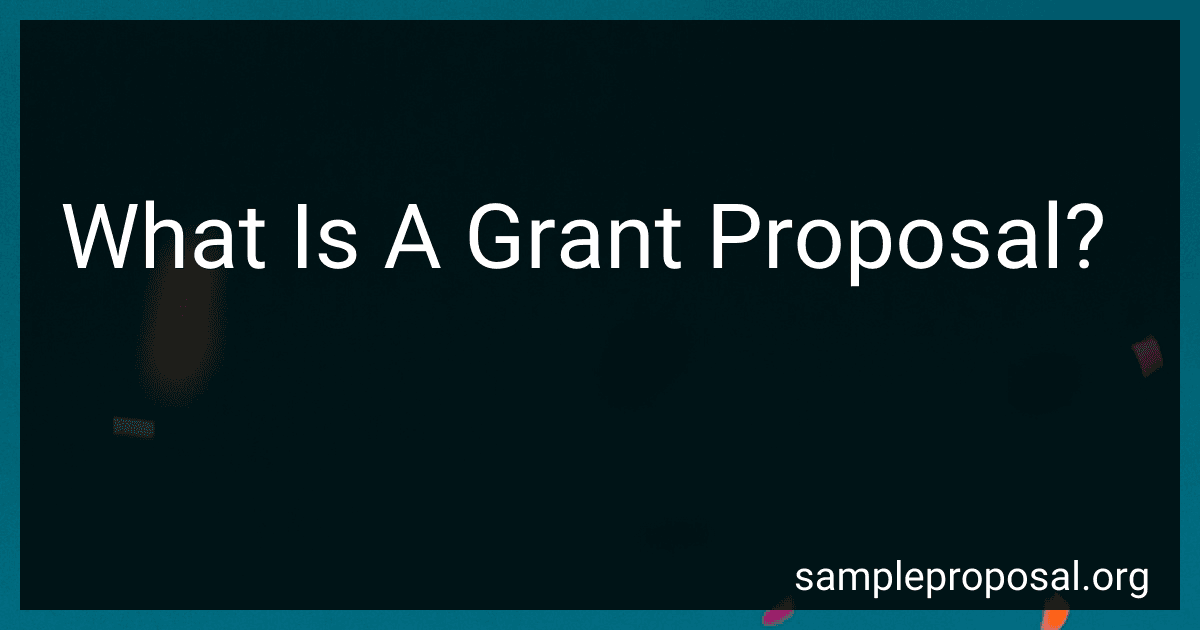Best Grant Writing Books to Buy in February 2026

The Only Grant-Writing Book You'll Ever Need


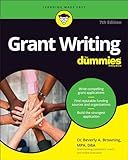
Grant Writing For Dummies


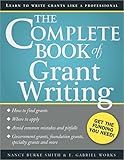
The Complete Book of Grant Writing: Learn to Write Grants Like a Professional (Includes 20 Samples of Grant Proposals and More for Nonprofits, Educators, Artists, Businesses, and Entrepreneurs)


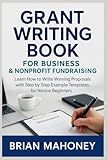
Grant Writing Book for Business & Nonprofit Fundraising: Learn How to Write Winning Proposals with Step by Step Example Templates for Novice Beginners


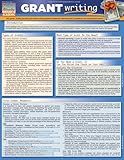
Grant Writing QuickStudy Laminated Reference Guide (QuickStudy Academic)


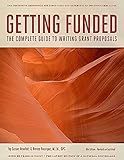
Getting Funded: The Complete Guide to Writing Grant Proposals
- MASTER GRANT WRITING TO SECURE FUNDING FOR YOUR PROJECTS.
- IDENTIFY IDEAL FUNDERS TO BOOST YOUR SUCCESS RATE.
- BUILD LASTING RELATIONSHIPS WITH FUNDERS FOR ONGOING SUPPORT.



How to Write a Grant: Become a Grant Writing Unicorn


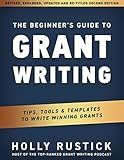
The Beginner's Guide to Grant Writing: Tips, Tools, & Templates to Write Winning Grants


A grant proposal is a written document that outlines a project or program and requests funding from a grant-making organization. It typically includes a description of the project, the goals and objectives, a detailed budget, and a plan for how the project will be implemented and evaluated. Grant proposals are used by nonprofit organizations, government agencies, and other groups to secure funding for a wide range of projects, from social services and education programs to scientific research and artistic endeavors. Writing a successful grant proposal requires careful planning, research, and attention to detail, as well as a clear understanding of the funder's priorities and requirements.
What is the typical length of a grant proposal?
The typical length of a grant proposal can vary depending on the specific funder and guidelines, but they usually range from 5 to 25 pages in length. Some funders may have specific page limits or word count requirements that grant applicants must adhere to. It is important for applicants to carefully review the guidelines provided by the funder to ensure that their proposal meets the required length.
How to find grant opportunities?
- Use grant search engines: Websites like Grants.gov, Foundation Center, and GrantWatch offer searchable databases of grant opportunities. You can narrow down your search based on criteria such as your location, field of interest, and grant type.
- Network with other organizations: Reach out to other organizations or contacts in your field who have received grants in the past. They may be able to provide insight into potential grant opportunities or connect you with grantmakers.
- Sign up for newsletters and alerts: Subscribe to newsletters, email alerts, and social media pages of grantmaking organizations or websites that specialize in listing grant opportunities. This way, you can stay updated on new grants that become available.
- Attend workshops and conferences: Many workshops and conferences for nonprofits and grantseekers include sessions on finding and applying for grants. Attending these events can help you gain valuable knowledge and make connections with potential funders.
- Check government agencies and foundations: Research government agencies and private foundations that fund projects in your field. Visit their websites or contact them directly to inquire about grant opportunities.
- Consult with a grant-writing professional: If you are new to grant writing or find the process overwhelming, consider hiring a grant-writing consultant or professional to help you identify and apply for grants that align with your organization's goals.
- Utilize local resources: Contact your local community foundation, library, or nonprofit support center for information on grant opportunities specific to your region. They may offer workshops, networking events, or other resources to help you find funding.
How to address potential weaknesses in a grant proposal?
- Acknowledge the weaknesses: Begin by acknowledging the potential weaknesses in your grant proposal. This shows transparency and honesty, and demonstrates that you are aware of areas that may need improvement.
- Provide context: Explain the reasons behind the weaknesses in your proposal. This can include limitations in resources, lack of expertise in certain areas, or challenges in the project implementation.
- Offer solutions: Propose solutions to address the weaknesses in your proposal. This could involve collaborating with experts or partners, seeking additional resources or support, or revising certain aspects of the project plan.
- Demonstrate impact: Highlight the potential impact of your project despite its weaknesses. Emphasize the importance of the project goals and the benefits it will bring to the community or target audience.
- Seek feedback: Consider seeking feedback from peers, colleagues, or mentors to help identify and address potential weaknesses in your proposal. External perspectives can provide valuable insights and suggestions for improvement.
- Revise and refine: Take the feedback received into consideration and revise your grant proposal accordingly. Make adjustments to strengthen the weaker areas and enhance the overall quality of the proposal.
- Re-submit: Once you have addressed the potential weaknesses in your grant proposal, review it thoroughly and ensure that it aligns with the grant guidelines and requirements. Submit the revised proposal with confidence and optimism.
How to follow up on a submitted grant proposal?
Following up on a submitted grant proposal is an important step in the grant application process. Here are some tips on how to effectively follow up on a submitted grant proposal:
- Wait for the specified timeline: Grantors typically provide a timeline for when they will review and make decisions on grant proposals. It is important to wait until this timeline has passed before following up.
- Contact the grantor: Once the specified timeline has passed, reach out to the grantor to inquire about the status of your proposal. You can do this by sending an email or making a phone call to the contact person listed on the grant application guidelines.
- Keep your communication professional: When reaching out to inquire about the status of your proposal, it is important to keep your communication professional and respectful. Clearly state your name, the name of your organization, and the grant proposal you submitted.
- Ask for feedback: In addition to inquiring about the status of your proposal, you can also ask for feedback on your proposal. This can help you understand any areas for improvement in future grant applications.
- Be patient: Grantors receive a large number of grant proposals and it may take some time for them to review and make decisions on each proposal. Be patient and follow up periodically if you do not hear back after your initial inquiry.
- Thank the grantor for their consideration: Regardless of the outcome of your grant proposal, it is important to thank the grantor for considering your application. This can help maintain a positive relationship with the grantor for future funding opportunities.
By following these tips, you can effectively follow up on a submitted grant proposal and increase your chances of success in securing funding for your organization.
How to request feedback on a rejected grant proposal?
- Be gracious: When you reach out to request feedback on a rejected grant proposal, it's important to be humble and gracious in your approach. Thank the funding organization for considering your proposal and express your desire to improve your future submissions.
- Ask for specific feedback: In your request, be specific about the kind of feedback you are looking for. For example, you may want to know why your proposal was rejected, what areas could be improved, or what specific criteria you did not meet.
- Request a meeting or call: If possible, ask for a meeting or phone call with the funding organization to discuss the feedback in more detail. This can help you to better understand the reasons for the rejection and gain valuable insights for future applications.
- Be open to criticism: It's important to approach the feedback process with an open mind and a willingness to learn from any criticism you receive. Use the feedback as an opportunity to improve your grant writing skills and strengthen your future proposals.
- Follow up: After receiving the feedback, be sure to follow up with a thank you note to express your appreciation for the organization's time and assistance. Keep the lines of communication open for any further questions or clarifications.
